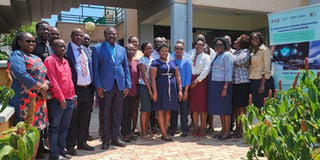Makerere, UVRI join forces to enhance laboratory cyber biosecurity

Makerere University researchers with UVRI Director Prof Pontiano Kaleebu during the cyber biosecurity workshop in Entebbe on Thursday. Photo | Eve Muganga
What you need to know:
- The cyberbiosecurity workshop, held at UVRI's Entebbe headquarters, aimed to raise awareness about emerging issues at the intersection of biosafety, biosecurity, and Cyber Biosecurity.
In a groundbreaking move, researchers from Makerere University's College of Veterinary Medicine, Animal Resources, and Biosecurity (COVAB) and Uganda Virus Research Institute (UVRI) have established Cyber Biosecurity Standard Operating Procedures (SOPs) to shield Ugandan laboratories handling high-risk biological materials from cyber threats.
"We set up Cyber Biosecurity SOPs to safeguard our laboratories from cyber attacks. Most laboratories have SOPs for safety, biosafety, and biosecurity, but they lack cybersecurity protocols, despite handling pathogens like anthrax, Ebola, and SARS-COV2," said Prof Lawrence Mugisha, Principal Investigator at Makerere University.
The cyberbiosecurity workshop, held at UVRI's Entebbe headquarters, aimed to raise awareness about emerging issues at the intersection of biosafety, biosecurity, and Cyber Biosecurity. Prof. Mugisha noted that limited knowledge in this field necessitates capacity building for personnel handling valuable biological resources.
Prof. Mugisha emphasized that the project's primary objective is to impart knowledge on identifying risks and vulnerabilities associated with cyber physical infrastructure and mitigating cybersecurity risks for biological laboratories.
UVRI Director, Prof. Pontiano Kaleebu, highlighted the critical role of biosecurity in institutions like UVRI, which handle dangerous viruses and develop new products. "We think that among the institutions in Uganda where biosecurity should play a key role is UVRI. This research is very important, so we have to keep our samples secure," he said.
Prof. Kaleebu cautioned that mistakes in research, such as genetically modifying mosquitoes to prevent malaria transmission, could increase malaria risks. He underscored the need for guidelines and SOPs to prevent harm.
The pilot project, launched in April 2024, aims to safeguard Ugandan laboratories from cyber threats and ensure the secure handling of high-risk biological materials.





